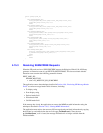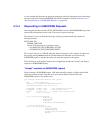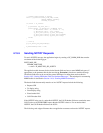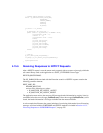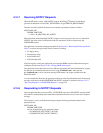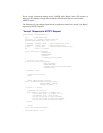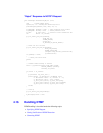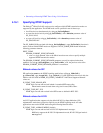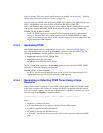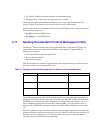4.15.7 Receiving NOTIFY Requests
When the SIP stack receives a SIP NOTIFY request, the Dialogic
®
Global Call API library
generates an Extension event (GCEV_EXTENSION) of type IPEXTID_RECEIVEMSG.
The data associated with this Extension event contains a parameter element as follows:
IPSET_MSG_SIP
IPPARM_MSGTYPE
• value = IP_MSGTYPE_SIP_NOTIFY
Both subscribed and unsubscribed NOTIFY requests can be received; in the case of a subscribed
NOTIFY, the value of the Call-ID header field will match the Call-ID of a previously sent
SUBSCRIBE request.
The application can use the techniques described in Section 4.9.6, “Retrieving SIP Message Header
Fields” to retrieve message header fields of interest, including:
• To display string
• From display string
• Event header field
• Call-ID header field
If the message has a body, the application can extract the MIME-encoded information using the
techniques described in Section 4.10.3, “Getting MIME Information”.
The application must retrieve the necessary SIP message header and body information by copying
the data into its own buffer before the next call to gc_GetMetaEvent( ). Once the next
gc_GetMetaEvent( ) call is issued, the message information is no longer available from the
metaevent buffer.
A code example that illustrates the general procedure for retrieving information from all incoming
messages associated with the SUBSCRIBE and NOTIFY methods is included in Section 4.15.2,
“Receiving Responses to SUBSCRIBE Requests”, on page 225.
4.15.8 Responding to NOTIFY Requests
Once an application has received a GCEV_EXTENSION event for a SIP NOTIFY message (either
subscribed or unsubscribed) and extracted the information from the event, it must send a response
message.
The response is sent as an Extension message using the following parameter element in the
parameter block:
IPSET_MSG_SIP
IPPARM_MSGTYPE
and one of the following two parameter values:
• IP_MSGTYPE_SIP_NOTIFY_ACCEPT
• IP_MSGTYPE_SIP_NOTIFY_REJECT




